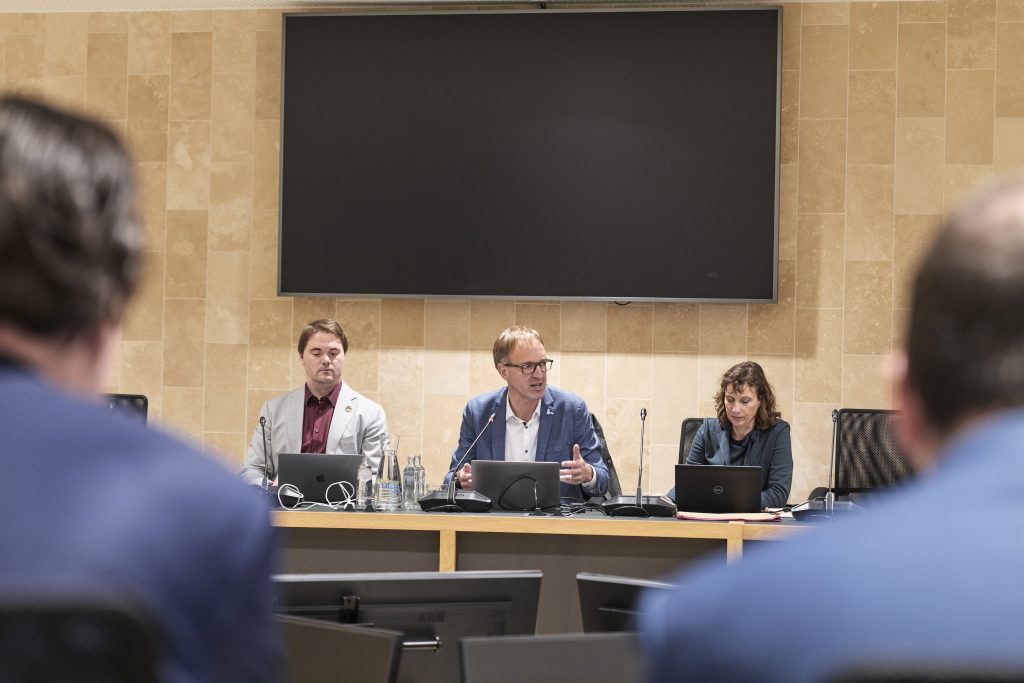Esta web utiliza cookies para que podamos ofrecerte la mejor experiencia de usuario posible. La información de las cookies se almacena en tu navegador y realiza funciones tales como reconocerte cuando vuelves a nuestra web o ayudar a nuestro equipo a comprender qué secciones de la web encuentras más interesantes y útiles.


Entrevista al rector de la Universidad de Gante y ex-Presidente de CESAER, Prof. Rik Van de Walle
Entrevistamos al que ha sido durante los últimos cuatro años el Presidente de CESAER (2020 – 2023), Rik Van de Walle (1970) que obtuvo los títulos de Máster en Ciencias en Ingeniería Física y Doctor en Ingeniería en la Facultad de Ingeniería y Arquitectura de la Universidad de Gante, y después de una estancia postdoctoral visitante en la Universidad de Arizona (Tucson, EE. UU.), regresó a Gante para convertirse en profesor y montar el Multimedia Lab, ahora llamado IDLab. Rik Van de Walle fue decano de la Facultad de Ingeniería y Arquitectura desde 2012 y desde el 1 de octubre de 2017 es rector de la Universidad de Gante.
What is CESAER? What is its mission?
Rooted in advanced engineering education and research, CESAER is an international association of leading specialised and comprehensive universities with a strong science and technology (S&T) profile. What its 58 members from 28 countries (among which are UPM as well as my university) have in common, is that they champion excellence in higher education, training, research and innovation, contribute to knowledge societies for a sustainable future and deliver significant scientific, economic, social and societal impact.
The mission of CESAER is twofold. The first aim is to defend the interests of its members through advocacy at the European level, where CESAER has the reputation of being a trusted, constructive and proactive partner especially towards the EU institutions. The second important area of activity is learning-among-peer-institutions by sharing and spreading intelligence, knowledge and best practices in research, education, innovation, and leadership at universities of S&T.

“An organisation such as CESAER can do a tremendous job here by bringing its individual members’ ideas, messages and capacities together and thus amplifying their impact. After all, CESAER calls itself ‘the strong and united voice of universities of science and technology in Europe’ – and rightly so”
Why is CESAER important for universities with a strong science and technology profile such as Ghent University and Universidad Politécnica de Madrid?
To maximise their autonomy and the academic freedom of their staff and to fully play their role as modern universities, our institutions ought to take an active role in shaping the national and international contexts in which they work. To be successful in this area and to influence policies and legislation notably at the European level, it is important that like-minded institutions join forces and speak with one voice.
An organisation such as CESAER can do a tremendous job here by bringing its individual members’ ideas, messages and capacities together and thus amplifying their impact. After all, CESAER calls itself “the strong and united voice of universities of science and technology in Europe” – and rightly so.
In 2023 CESAER’s annual meeting was held in Madrid, organised in the ETSII by UPM on 18-20 October. The overarching theme of the conference was “Contribution of universities of science and technology to sustainability”. Why was this theme chosen?
It goes without saying that among the most pressing challenges of our time are sustainability and sustainable development, with climate change attracting deservedly more attention than ever before. As the contribution of universities of science and technology to sustainability had been at the core of CESAER’s activities during my entire term as its President (2020-2023) it was logical to choose it as the theme of the final annual meeting of my Presidency. The events in Madrid were also the perfect occasion to celebrate two of the main deliverables of CESAER’s work plan 2022-2023, our declaration ‘Contributions of Universities of S&T to Sustainability’ and the white paper ‘Leading by example: Boosting sustainability through good governance adopted by universities of S&T’
How can universities of science and technology contribute to the challenges the world faces related to climate change?
As key generators of scientific knowledge, technology and talent, universities of science and technology have always played a crucial role in tackling any pressing local and global challenges – and thus also those resulting from climate change. It is through their key and interrelated activities that their impact on finding effective solutions will be the largest: transformative research that feeds into innovative products and processes on the one hand, and teaching the science behind climate change, and the technology to help solve the challenges it poses, to future generations on the other.
In addition, through their intellectual leadership and the respect they command as sources of scientific knowledge, technology and talent, universities of science and technology can stimulate other societal players to assume responsibility. Of course, this role comes with the imperative to lead by example and act as dedicated actors contributing to environmental sustainability within their own institutional contexts.
What are the biggest challenges and barriers that universities face in order to achieve this?
Universities can only thrive in a context in which their autonomy as well as the academic freedom of their staff is maximally safeguarded. Challenges to contribute to sustainability therefore include lack of sustainable funding, (differences in) legislation that limit(s) the free circulation of knowledge and its bearers, as well as disruption in balance between investigator-driven frontier research towards more politically driven research priorities. Of course, urging authorities and the broader society to grant maximal organisational autonomy and academic freedom comes with the responsibility to also safeguard these fundamental values with one’s own institutional context.
In his written contribution to CESAER’s annual meeting, the Secretary General of the United Nations, Antonio Guterres, stated: “I count on your contribution to these ongoing efforts. Together, let us harness science and technology to build a more just and sustainable world for all.” If you need to explain the implications of this hope of Antonio Guterres to your university community in two or three sentences, what would these be?
No matter how pressing the climate and sustainability crises are, they should not lead to despair. Quite the contrary, by continuing to push the frontiers of human knowledge we as academics can and will play a catalytic role in finding effective solutions – not only for the urgent challenges that we are facing today, but also for those that undoubtedly are already looming behind the horizon.
You have been the Rector of Ghent University for 6 years. How is your institution transforming its mission in this respect?
One of the main drivers to become Rector of Ghent University was to give our academics back control over their careers and activities. In 2018 already, our university decided to drastically reform the career path and evaluation policy for its professorial staff. In the new model (internationally sometimes being referred to as ‘The Ghent Model’), a predominantly quantitative and output-driven assessment process made way for more supportive and trust-based evaluation practices prioritising intrinsic motivation, open feedback, and collaboration.
Last year, then, we took another major step in internally reinforcing the academic freedom of our academics, by setting up an internal system to grant non-competitive basic research funding to all our professors. Simply said: each and every professor at Ghent University will annually receive an amount of money to support his or her research. We will grant this funding without lengthy application procedure, without harsh internal competition, without severe conditions and burdensome administration: we have every faith in our staff that they will do what they were hired for – academic research and teaching – and we want to make sure that they dispose of the means to do so.
Admittedly, taking such drastic measures as an individual university if you are not sure whether other institutions and the sector as a whole will follow suit is not easy and requires quite a lot of internal deliberation and persuasion. Yet, I would not have taken these steps if I were not convinced that they will change the academic game for the better – and the broader reform of research assessment that is currently taking place in Europe and beyond proves that we were right to change direction.
Entrevistado: Rik Van de Walle, rector de la Universidad de Ghent y ex-Presidente de CESAER.
About Rik Van de Walle (1970): He obtained the degrees of Master of Science in Engineering Phsics and Doctor of Engineering at the Faculty of Engineering and Architecture at Ghent University.After a visiting post-doctoral fellowship at the University of Arizona (Tucson, USA) he returned to Ghent to become professor and to set up the Multimedia Lab (part of iMinds and later imec). After a merger with two other research groups the Multimedia Lab was renamed as IDLab. Rik Van de Walle was dean of the Faculty of Engineering and Architecture from 2012 and since 1 October 2017 he is rector of Ghent University. He is also the former president of CESAER (2020-2023).

